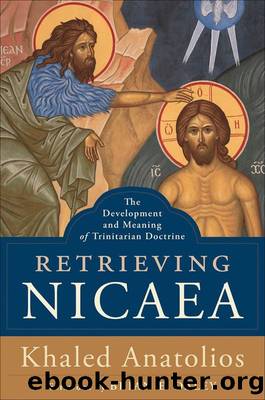Retrieving Nicaea: The Development and Meaning of Trinitarian Doctrine by Khaled Anatolios

Author:Khaled Anatolios [Anatolios, Khaled]
Language: eng
Format: epub
Publisher: Baker Publishing Group
Published: 2011-08-01T00:00:00+00:00
The Trinitarian Systematic Theology of the Catechetical Oration
Gregory of Nyssaâs Catechetical Oration, composed after the Council of Constantinople in the early 380s, appears to be intended not so much for catechumens directly as for catechists.[609] In view of modern ideas of the proper contents of âtrinitarian doctrine,â it might seem odd to refer to this work as a trinitarian systematic theology. After all, apart from some preliminary remarks at the beginning of the treatise, the theme of âhow the three are oneâ is not prominent in this work. Indeed, the bulk of the treatise is concerned with the incarnation, inducing its placement in the modern compartment of âChristology.â Yet Gregory explicitly states at various points that his purpose is to argue that the Christian revelation proclaims a âfitting conception of God.â[610] Does Gregory simply forget his trinitarian commitments once he gets past his opening remarks on the Word and the Spirit? If we insist on our preconceptions regarding the proper domain of trinitarian doctrine, we will be tempted to think so. An alternative approach, however, is to at least temporarily put aside these presuppositions and allow Gregoryâs exposition of the Christian doctrine of God to suggest to us a different way of conceiving what is involved in âtrinitarian doctrine.â I cannot here provide a detailed analysis of this treatise. Instead, I will trace the development of a key motif that is in continuity with the earlier Against Eunomius: Gregoryâs christologically determined conceptions of trinitarian divine perfection and goodness. In my analysis of Against Eunomius, I have tried to show how these motifs inform a doctrine of God that is determined by the christological narrative. If we had to pinpoint the key trinitarian move of Against Eunomius, it would not be Gregoryâs use of hypostasis and ousia but his insistence on the christological determination of the doctrine of God. This key move, re-performed in a more integral catechetical setting in the Oration, entitles us to see it as a classic exposition of trinitarian doctrine.
Gregory begins his treatise by defending the intelligibility of the Christian doctrine of God against its main cultural competitors: Greeks and Jews. The Greeks are made to represent two competing views: atheism and polytheism. Atheism is unintelligible in light of the intelligent design of creation, which indicates âsome power (dynamin) which is manifested by it and which transcends the universe.â[611] Polytheism is equally untenable in light of the principle of the simplicity of absolute perfection. Gregory challenges an imaginary polytheist: âDoes he think the divine is perfect or imperfect?â[612] If this interlocutor acknowledges that the divine nature is perfect, then he must logically concur that absolute perfection cannot admit of variation or difference. Different gods are as inconceivable as different perfections. These putative differences will either entail a variation of greater and lesser, in which case the lesser is not perfect and thus not God, or there will be no âdistinguishing marksâ to identify the differences, in which case there is no real plurality. Thus, there can be only one perfect and divine nature.
Download
This site does not store any files on its server. We only index and link to content provided by other sites. Please contact the content providers to delete copyright contents if any and email us, we'll remove relevant links or contents immediately.
Christian Ethics by Wilkens Steve;(854)
Christian Ethics for a Digital Society by Kate Ott(778)
Fearfully and Wonderfully Made by Philip Yancey & Paul Brand(769)
God and the Multiverse by Victor J. Stenger(672)
Numbers by Ronald B. Allen(632)
How to Read Slowly by James W. Sire(613)
Christian Ethics: An Introduction to Biblical Moral Reasoning by Wayne Grudem(597)
The City of God by Saint Augustine & Marcus Dods(577)
Monastic Archaeology by Unknown(564)
Morality by Jonathan Sacks(564)
The Technological System by Jacques Ellul(543)
Amish Grace by Donald B. Kraybill & Nolt Steven M. & Weaver-Zercher David L(531)
Death of the Doctor by Unknown(525)
The Disabled Church by Rebecca F. Spurrier;(521)
Jesus: A New Vision by Whitley Strieber(518)
Children of Lucifer; The Origins of Modern Religious Satanism by Ruben van Luijk(505)
Critical Writings by Joyce James;(499)
Redeeming Sociology by Vern S. Poythress(485)
The Church in the Early Middle Ages by G.R. Evans(474)
